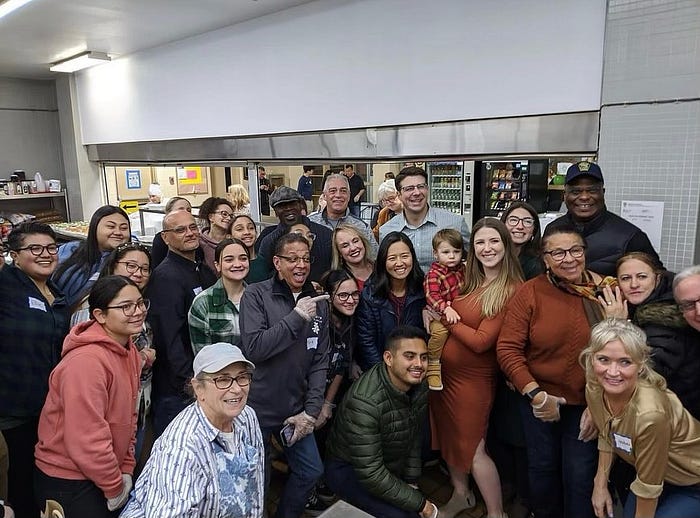Why we need third places
To find purpose together in our communities

This year, on Thanksgiving morning, my children and I joined a community Thanksgiving for our first time, and started what I hope will be a new family tradition.[1]
We stood at one of several stations in the Salesian Boys & Girls Club’s commercial kitchen. We opened each paper to-go bag and filled it with hand-packed containers with cheese, pepperoni and crackers; salad; turkey dinner with fixings; and pie.
Once we assembled a few, we rushed them up the stairs to the side exit. Together with Tommy, the Superintendent for East Boston’s Region of Boston Public Schools, and his son, we distributed these sets of bags to drivers and passengers as quickly as we could make them. All were cheerful as they picked up these bags and contemplated a great holiday ahead.
After distributing our bags, we returned downstairs to assemble some more.
—
It takes a village to support a village
More than thirty volunteers from East Boston and neighboring communities, speaking English Spanish, and other languages; and including our Mayor Wu, Senator Edwards, Councilor Coletta, and Rep. Madaro (whose Madaro Family Community Fund made it all possible) prepared the meals and packaged, distributed and served them.
In addition to the pickup option at the side door, the Madaro Family Community Fund staffs restaurant style-dining onsite. Volunteers deliver the full multi-course meal, and conversation and connection with members of our community — some of whom otherwise would be dining alone.

— —
A shared sense of purpose
Several recent posts[2], including two based on an interview with Prof. Rick Weissbourd, examined interrelated trends of increasing social isolation, crises of purpose and meaning, and declining membership in faith communities.

Two weeks ago, we discussed the role of third places — particularly intergenerational ones — in building relationships in community.

This week, we focus on the role third places can play in building purpose in community.
—
Third places include community hub organizations, like Salesian Boys & Girls Club; churches, libraries, and businesses. In third places, neighbors can help neighbors, and thereby connect with purpose. In providing opportunities and locations for regular volunteering and giving, third places also support strong, multi-generational relationships.
— —
Learning about purpose together
Community third places not only provide opportunities for neighbors to support neighbors, but also serve as centers for developing, and learning together about, community values. Third places help us forge a collective sense of identity: who we are and who we want to be, and strengthen our shared sense of belonging and purpose.
As an example, through East Boston Social Centers children’s programs, diverse team members from our community share the meaning of the motto we have held for generations: “When all give, all gain.”
This idea, both universal and uniquely ours, provides a special anchor to purpose in our community. It helps our children feel a sense of belonging, and develop their identity as members of this community.
— —
How can third places address the crisis of purpose?
—
Organizations and business that reach people across generations can strengthen our focus on shared values and ideals, in partnership with our communities. We can elevate values that go beyond the self, that help us support each other, our communities, and our world.
We can more intentionally share those values in our third places and programs.
We can increase volunteer opportunities — as highlighted in this blog post.
—
We need philanthropic, government, and health care/ public health investments in these community infrastructures to support our robust response to the crisis of purpose. Funding can enable community volunteer and support activities, and help organizations develop and sustain a robust volunteer infrastructure.
Government also can partner with nonprofits to plan activities in third places, recruit volunteers, and publicize opportunities for gathering and service.
—
Community design can include intentional inclusion of third places. Design also can incorporate nudges toward shared purpose — pointing people toward third places, incorporating information about community activities, and inspiring reflection and connection.
—
Local news media can reinforce community values and amplify opportunities in third places.
—
Individuals can join or support these third places; we can donate, volunteer, or help plan new events and opportunities for connection. We can spread the word to neighbors.
—
Through third places, we can weave a stronger civic fabric together, and reverse the crisis of purpose.
— —

— —

— —
Please share, subscribe, and join our movement by emailing me or supporting East Boston Social Centers.
Please help us make hunger history; support my family’s Walk for Hunger here.
This is the 53rd post about boosting joy the only way we can: in community.
— —
[1] I look forward to the day when hunger is history. East Boston Social Centers is excited to be joining Project Bread’s coalition to end hunger in Massachusetts. My family is excited to be joining the Walk for Hunger (please donate here). However, even when this dream is achieved, events like the Madaro Family Community Fund Thanksgiving will remain important — giving isolated neighbors a place to enjoy Thanksgiving in community.
[2] This post is a sequel to this one about third places and relationships. See also these posts from conversations with Prof. Rick Weissbourd.

